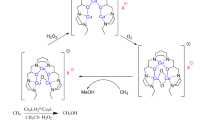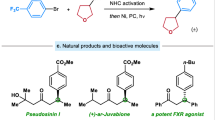Abstract
IN connexion with a problem of biosynthesis, we had occasion to prepare a sample of ethanol in which some of the α-hydrogen atoms were replaced by deuterium. This was done by heating propionic acid with deuterium sulphate, recovering the labelled propionic acid and treating its silver salt with bromine in carbon tetrachloride; the resulting ethyl bromide was hydrolysed by heating with water or with aqueous silver sulphate. Absence of deuterium from the methyl group of this alcohol was proved by oxidation to acetic acid with aqueous potassium permanganate. The silver salt of this acetic acid contained very little deuterium (0·03—0·06 per cent excess), and this was not due to exchange with the aqueous medium during oxidation, for a parallel experiment on ordinary ethanol in a heavy water medium also afforded deuterium-free silver acetate. Analysis of the labelled ethanol as ethyl 3 : 5-dinitrobenzoate indicated a deuterium excess of 40 'atom per cent' on the two α-hydrogen atoms. The sample was thus a mixture of CH3CH2OH, CH3CHDOH and CH3CD2OH.
This is a preview of subscription content, access via your institution
Access options
Subscribe to this journal
Receive 51 print issues and online access
$199.00 per year
only $3.90 per issue
Buy this article
- Purchase on SpringerLink
- Instant access to the full article PDF.
USD 39.95
Prices may be subject to local taxes which are calculated during checkout
Similar content being viewed by others
Author information
Authors and Affiliations
Rights and permissions
About this article
Cite this article
CORNFORTH, J., POPJÁK, G. Chromic Acid Oxidation of Ethyl Alcohol. Nature 164, 1053 (1949). https://doi.org/10.1038/1641053a0
Issue date:
DOI: https://doi.org/10.1038/1641053a0
This article is cited by
-
Kinetics and mechanism of oxidation of pyruvate by permanganate ion in aqueous perchlorate solution
Transition Metal Chemistry (2018)
-
Hydrodimerization of acrylonitrile
Bulletin of the Academy of Sciences of the USSR Division of Chemical Science (1958)



